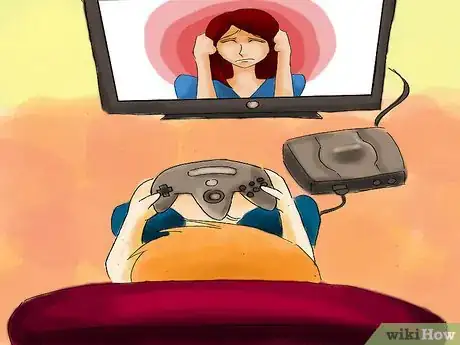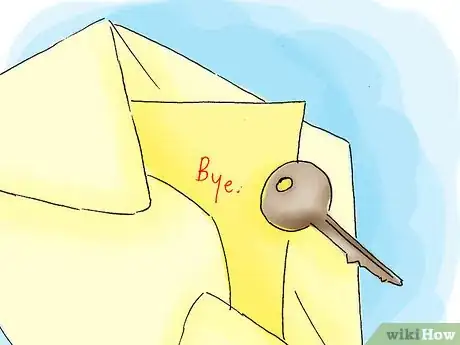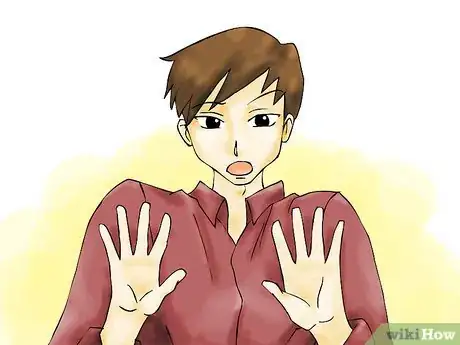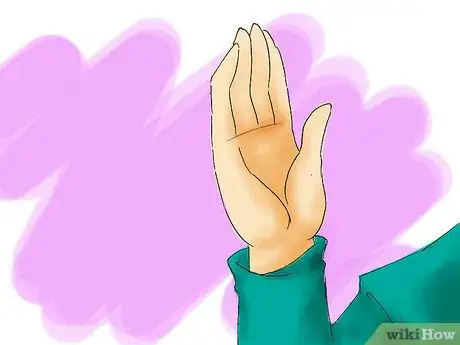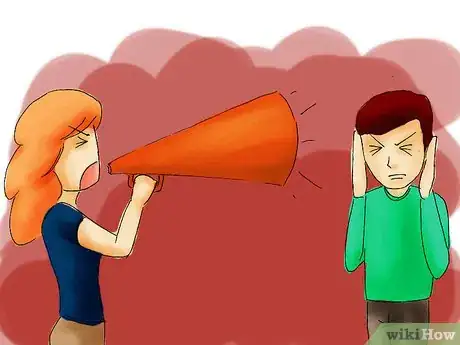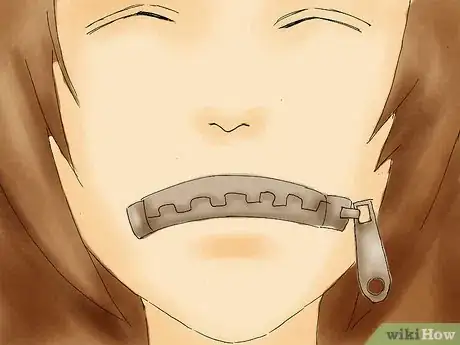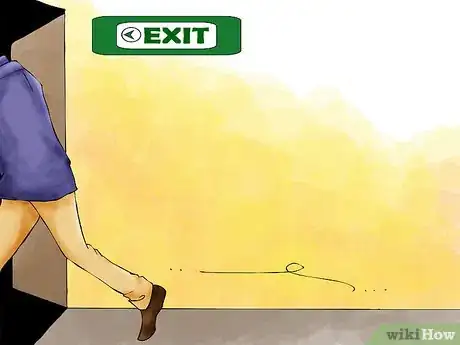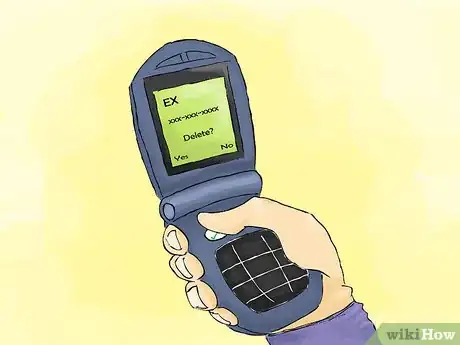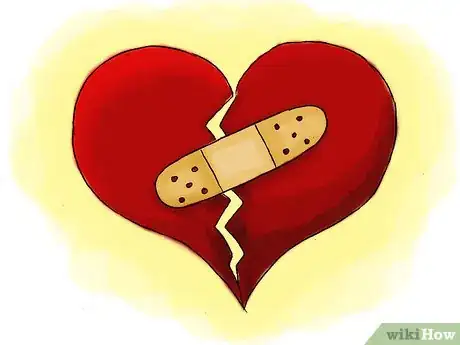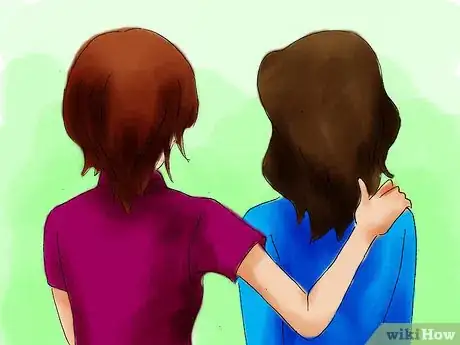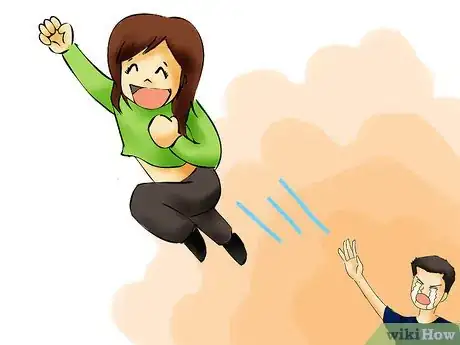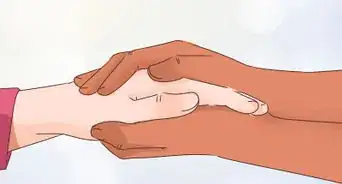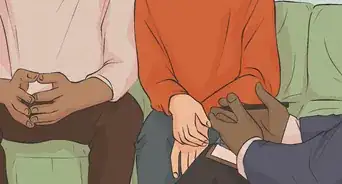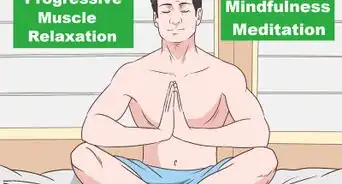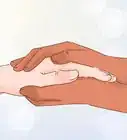This article was co-authored by Moshe Ratson, MFT, PCC. Moshe Ratson is the Executive Director of spiral2grow Marriage & Family Therapy, a coaching and therapy clinic in New York City. Moshe is an International Coach Federation accredited Professional Certified Coach (PCC). He received his MS in Marriage and Family Therapy from Iona College. Moshe is a clinical member of the American Association of Marriage and Family Therapy (AAMFT), and a member of the International Coach Federation (ICF).
There are 11 references cited in this article, which can be found at the bottom of the page.
wikiHow marks an article as reader-approved once it receives enough positive feedback. This article has 32 testimonials from our readers, earning it our reader-approved status.
This article has been viewed 1,468,600 times.
Ending a controlling or manipulative relationship can be even harder than being in one. Though you may think that you don't have the courage to end the relationship or that your partner won't be able to make it without you -- even if they hurt you all the time -- you won't be able to start living life on your own terms until you make the break. If you want to truly end the relationship, then you have to prepare in advance, execute your plan, and follow through. The most important part is building up the courage to do it.
Steps
Prepare to End the Relationship
-
1Recognize that you're being controlled. Many controlling or manipulative relationships last far longer than they should because the person who is being controlled or manipulative is in denial about anything being wrong. You may think your partner is just a bit moody or needy when in fact, that person has slowly taken over every aspect of your life. Here are some signs that you're in a manipulative or controlling relationship:[1]
- If you've noticed that the person has slowly begun to take over every aspect of your life -- from how often you see friends to where you go for dinner -- then you're being controlled.
- If the person you're with has angry or emotional outbursts followed by telling you how much s/he needs you or loves you, then the person is trying to control you with his/her emotions.
- If you've tried to leave before and the person has threatened violence or even suicide, then you're being threatened and manipulated.
- If the person you're with is extremely jealous and hates it when you hang out with your friends, especially with people of the opposite gender, and makes it difficult for you to hang out with other people, then you're being controlled.
- If your partner has put you down in front of friends and family, has discouraged you from speaking too much in public, and gives you a scary look that makes you keep quiet, then you're being controlled.
- If you find yourself giving in to your partner time and time again because you're afraid of how s/he will act if you don't, then you need to get out of the relationship.
- If you're being pressured to do things you don't want to do, especially sexually, then you're being controlled.
- If you find yourself desperate to please that person at any cost, then you've stopped thinking about yourself.
- If the person makes you feel like there's no way out of the relationship and that you'll never find someone else who wants you, then you're being manipulated into staying in the relationship.
-
2Think of all the reasons you need to leave. Once you realize you're in a controlling or manipulative relationship, you need to start thinking about how much better your life will be when you're done with it. This will motivate you to leave and to start making a game plan for getting out. Write these reasons down to firmly plant them in your mind, and to make you see that you need to get out ASAP if you want to start enjoying your life again. Here are some reasons why you need to leave:[2]
- You can start being your own person again. Write down all of the things you loved doing before the relationship, from grabbing fro-yo with your friends to spending hours taking long walks by yourself, that your partner no longer "lets" you do.
- You can start enjoying your other relationships. Remember how you used to hang out with your buddies before your girlfriend stepped in and said every night would be date night? Write down your favorite memories from hanging out with your friends and family and think of all the fun and fulfillment you can have once you start enjoying those again.
- Your self-esteem will skyrocket. Right now, your self-worth may be based on how good your partner may make you feel at a given moment, and once you're out of there, you can assess yourself on your own terms. And if your self-esteem is low because you know you're letting yourself give in to an emotional or unstable person, you'll feel better once you stop doing that.
- You can stop living in constant fear and anxiety. Instead of worrying about how your significant other will react to something you'll do or say, you can just enjoy your life.
- You can even have a good friend help you generate some reasons -- a friend may have an insight into your relationship that you don't have, and s/he can motivate you to leave.
Advertisement -
3Plan what you'll say. You should keep it short and sweet and not leave room for the other person to try to reason with you, to beg you to change your mind, or to promise that s/he will change or do anything you want to stay in the relationship. You don't have to give a million reasons for why you're leaving or to list all of the times the person has disappointed you -- that will only make things more difficult.
- Just say, "This isn't working for me" or "It's time to say goodbye," and give a few more statements, but keep it brief.
- There's no point in being vindictive or accusatory. That will only make your partner more emotionally volatile.
- Be as calm as you can when you deliver this news. Don't yell, cry, or pace around. Keep it almost matter-of-fact, even if you're hurting inside. If you're obviously emotional, your partner will see that you can be manipulated.
- Once you've figure out what you'll say, you should practice how you'll say it. This will help you be comfortable with the words.
-
4Plan how you'll say it. The method of delivery is very important when you're dealing with an unstable or controlling person. The most important thing to think about is that if the person is at all violent or if you're truly afraid of how the person will react, then you should give the news in a public place, where you feel safe -- bring a friend if necessary.
- If you really don't even want to face the person, just write them a note or email. If it's gotten so bad that you're afraid to talk face to face, then just get out whatever way you can.
- Though once you've decided to end the relationship, you should act quickly, give some thought to the timing. Don't end the relationship after you and/or your partner have been drinking, or in the middle of a very stressful event. Try to pick a time when your partner is likely to be a bit more stable -- even if that isn't saying much.
-
5Come up with an escape plan.[3] If you live with the person or if you've just left a lot of things at his/her place, you should think about how you'll get back your stuff. You can try to be sneaky and get it out before you break up with the person, so you don't have to go back after you do it. Have a few friends come and help you get the stuff, whether it's behind the person's back or after the break-up. This will make you feel safer and more motivated to leave.[4]
- If you do live with the person, you should also find a place to stay before you initiate the break up, so you're not stranded and tempted to go back.
-
6End the relationship in your mind. Before you say what you have to say, tell yourself that it's really over and start dealing with the natural mourning that comes after a serious relationship is over. If you start already thinking of yourself as broken up -- without telling your significant other -- you'll feel stronger when you say what you have to say because you've already made up your mind.[5]
Execute Your Plan
-
1Be firm.[6] This is the most important thing to consider as you tell the person you're breaking up. Once you've said it, you've said it, and there's nothing the person can do or say to make you change your mind. Say the words you've practiced, and get ready to leave. Even if the person is crying or looks absolutely pathetic, just remember all those reasons why you need to leave.[7]
- The person may say, "But you haven't given me a chance to explain!" That's too bad -- actually, you've given them way too many chances.
-
2Keep it short. Don't linger around to give in to your partner's emotion or list the forty things s/he did to ruin your life. The shorter your explanation, the less likely your partner will be to argue with you or to nitpick. Remember -- this is not a negotiation, so don't be open to a dialogue. Say your piece, and get out.
-
3Keep your distance. Stand or sit away from the person -- don't let them try to touch you, hug you, or just trap you into staying in the relationship. If the person tries to hold your hand, you may feel tempted to just be tender with the person again instead of doing what you intended to do, which is walk away.
-
4Don't get manipulated. If you've been manipulated throughout the relationship, then it's very likely that you'll get manipulated during the break-up. Don't let the person try to sway you with his emotions, tell you that you'll never find someone else, or bribe you with all of the things he can do for you if you stay, whether it's to marry you, buy you a house, or go to anger management classes.[8]
- Remind yourself that you're leaving the relationship because you're tired of this exact behavior. It's not going to work on you anymore.
-
5Don't tell the person where you're going. It may be obvious that you're going to stay with your parents or at your best friend's house, but don't mention it. Don't give the person an opportunity to follow you to try to win you back, or even to start stalking you.[9]
-
6Walk away. Once you've said what you had to say, just go. If you have a friend waiting in the car, or with you, walk out with that friend. Don't look back for one last tender gaze at your former significant other -- he or she made you feel miserable and worthless, and you're done with all that. Hold your head high and walk out the door and don't ever look back.
Follow Through
-
1Avoid contact with the person. Don't let the person call you, text you, Facebook you, or even show up in places where you're likely to be -- get a restraining order if you have to. Talking to the person will only make you feel more confused and hurt, and things could get ugly. Don't be tricked if the person says that he or she just want to chat, or that s/he misses you -- your ex will only try to get you back in whatever way possible.
- If you need to talk the person for any reason, like to get back more of your things, or work out something practical related to mutual belongings, bring a friend with you and do it in a public place.
- If you and the person have a lot of mutual friends, you'll have to cut off contact with them for a while. Don't go to places where you know your ex will be, even if that means laying low for a while.
-
2Don't be tempted to change your mind. It's natural that you'll feel sad and lonely without your significant other. If s/he controlled every aspect of your life and you're suddenly on your own again, having to make decisions for yourself, it's logical for you to feel unable to handle the smallest decisions, and to feel completely alone and overwhelmed. But this is exactly how your ex wanted you to feel -- like you couldn't possibly live a day of your life without them.[10]
- Keep telling yourself that it will get easier -- it really will.
- Remind yourself that, before the relationship, you were perfectly fine on your own, and that you can be that person again.
-
3Spend time with your loved ones.[11] Though it's helpful to spend some time to reflect on your own after a break up, this is not the time to spend all of your time alone. Instead, lean on your friends and family and spend as much time with others as you can. Though the last thing you want to do may be to go to a party, force yourself out and try to have some fun.[12]
- Though you should spend more time alone during a more standard breakup, spending a lot of time alone after ending a manipulative or controlling relationship will make you more likely to want to go back to your ex.
- Your friends and family are your support system. Talk to them about how bad the relationship was -- having them confirm your thoughts will make you feel stronger.
- Don't be afraid to reach out. Maybe you lost touch with some close friends because of your controlling partner. Just be honest and say you know you made a mistake for cutting your friends out of your life, and they should take you back.
-
4Stay busy. If you spend all of your time wallowing in your room or watching TV by yourself in the dark, you'll never be able to get over the relationship. Try to stay as busy as you can by hanging out with friends, pursuing your interests, and immersing yourself in your work or studies. You can even find a new hobby to try to pursue on your own, which will give more meaning to your life.[13]
- Whatever you do, just try to get out of the house. This will make you feel less alone, even if you're only reading by yourself in a coffee shop.
- Plan your week. Leave some time for reflection, but make sure you have something to look forward to every day.
- Think of this as an opportunity to try something you never got to do with your ex. Maybe he hated something as simple as eating sushi or going to the movies -- do those things to your heart's content.
-
5Think of how much happier you are. This part may take a while, but you'll slowly see how much better you are on your own and away from the terrible relationship. Every night before you go to bed, think of one thing that you're now able to do away from the relationship. You can even make a list of all of the ways that your life is better and how great it is to feel in control of your thoughts and actions.
- Whenever you have a moment of weakness, review this list, or recite all of the reasons why your life is better. Give it time and you'll see that you were right for being brave and making the right choice.
Expert Q&A
Did you know you can get expert answers for this article?
Unlock expert answers by supporting wikiHow
-
QuestionHow do I deal with a manipulative partner?
 Moshe Ratson, MFT, PCCMoshe Ratson is the Executive Director of spiral2grow Marriage & Family Therapy, a coaching and therapy clinic in New York City. Moshe is an International Coach Federation accredited Professional Certified Coach (PCC). He received his MS in Marriage and Family Therapy from Iona College. Moshe is a clinical member of the American Association of Marriage and Family Therapy (AAMFT), and a member of the International Coach Federation (ICF).
Moshe Ratson, MFT, PCCMoshe Ratson is the Executive Director of spiral2grow Marriage & Family Therapy, a coaching and therapy clinic in New York City. Moshe is an International Coach Federation accredited Professional Certified Coach (PCC). He received his MS in Marriage and Family Therapy from Iona College. Moshe is a clinical member of the American Association of Marriage and Family Therapy (AAMFT), and a member of the International Coach Federation (ICF).
Marriage & Family Therapist
-
QuestionHow can I protect myself from a manipulative person?
 Moshe Ratson, MFT, PCCMoshe Ratson is the Executive Director of spiral2grow Marriage & Family Therapy, a coaching and therapy clinic in New York City. Moshe is an International Coach Federation accredited Professional Certified Coach (PCC). He received his MS in Marriage and Family Therapy from Iona College. Moshe is a clinical member of the American Association of Marriage and Family Therapy (AAMFT), and a member of the International Coach Federation (ICF).
Moshe Ratson, MFT, PCCMoshe Ratson is the Executive Director of spiral2grow Marriage & Family Therapy, a coaching and therapy clinic in New York City. Moshe is an International Coach Federation accredited Professional Certified Coach (PCC). He received his MS in Marriage and Family Therapy from Iona College. Moshe is a clinical member of the American Association of Marriage and Family Therapy (AAMFT), and a member of the International Coach Federation (ICF).
Marriage & Family Therapist
Warnings
- Don't assume that a mild, calm encounter with this person will end well for you; resist the urge to re-engage with your ex.⧼thumbs_response⧽
- If your ex is at all prone to violent outbursts, exercise extreme caution at any chance meeting.⧼thumbs_response⧽
- Children and teens are especially prone to controlling or manipulating, and may be told they were abandoned, used as a messenger, or be pumped for information about you. This is why, as the stable parent, it's incumbent upon you to get them the professional help they will need to recognize and deal with their unstable parent.⧼thumbs_response⧽
- Take everything valuable to you and leave nothing behind when you leave, as your ex may try to force you into meeting again by holding valuables hostage or forcing you to try and pay off debts you incurred as a couple (which would result in having to keep in regular contact, and allows for more manipulation).⧼thumbs_response⧽
- If you have children, do be careful not to alienate them from their other parent; simply be there to explain behaviors to them which leave them feeling confused or feeling hurt or guilty. If your ex is dangerous, and you fear that they may abduct or harm the children, inform an officer of the court, the police, or other authorities of this so that protective arrangements can be made.⧼thumbs_response⧽
- If your ex tries to manipulate mutual friends, don't get angry or get back into contact with your ex - the people who know you will figure out which of you is the more truthful, more by your responses and actions than anything else. Shrug it off and make it clear you can't stop your ex from saying such things.⧼thumbs_response⧽
- Not every controlling or manipulative person is dangerous, but some are. Most will respond to a show of strength - if you show up with friends or relatives to back you up, or if you refuse all contact, this will often be enough to make your point and put an end to things. If not, enlist help, either from police (a restraining order) or from a mental health specialist who may be able to help you identify whether your ex is a danger to you or others, or to themselves, and will know the appropriate steps to take in that case.⧼thumbs_response⧽
References
- ↑ https://www.psychologytoday.com/us/blog/friendship-20/201506/20-signs-your-partner-is-controlling
- ↑ https://www.ncbi.nlm.nih.gov/pmc/articles/PMC4535319/
- ↑ Moshe Ratson, MFT, PCC. Marriage & Family Therapist. Expert Interview. 7 August 2019.
- ↑ https://www.helpguide.org/articles/abuse/getting-out-of-an-abusive-relationship.htm/
- ↑ https://www.womenshealth.gov/relationships-and-safety/domestic-violence/leaving-abusive-relationship
- ↑ Moshe Ratson, MFT, PCC. Marriage & Family Therapist. Expert Interview. 7 August 2019.
- ↑ http://www.womenagainstabuse.org/education-resources/learn-about-abuse/why-its-so-difficult-to-leave
- ↑ https://blogs.psychcentral.com/psychology-self/2017/11/things-abusers-say/
- ↑ http://nprdap.org/safety-planning/
- ↑ https://www.psychologytoday.com/us/blog/happiness-is-state-mind/201805/overcoming-the-aftermath-leaving-toxic-relationship
- ↑ Moshe Ratson, MFT, PCC. Marriage & Family Therapist. Expert Interview. 7 August 2019.
- ↑ https://www.psychologytoday.com/us/blog/invisible-chains/201512/recovery-after-controlling-relationship
- ↑ https://www.webmd.com/balance/news/20100803/stay-busy-stay-happy
- ↑ Moshe Ratson, MFT, PCC. Marriage & Family Therapist. Expert Interview. 7 August 2019.
About This Article
To end a controlling or manipulative relationship, try to keep the conversation short so they don’t have a chance to manipulate you into staying. Say something like, “I’m sorry if this hurts your feelings but this relationship isn’t working for me. I’ve made my decision.” If you’re worried about them being violent, break up with them in a public place or bring a friend with you for moral support. Alternatively, leave them a note or call them if you’re afraid to tell them face to face. Once you’ve delivered the news, walk away and don’t look back. As soon as you’ve left, remove them from social media and block their number so they can’t abuse you anymore. For more tips, including how to recover after leaving a controlling relationship, read on.
